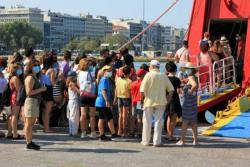Greek Orthodox Easter
This year, the Greek Orthodox Easter Sunday falls on Sunday 16th April. Easter in Greece is the most celebrated festival throughout the whole year, commemorating not only the crucifixion and resurrection of Jesus Christ, but also considered to mark the passing of Winter to Spring. In Greece, Easter is known as Paskha*, the Greek word for 'passover', which is celebrated with an entire week of festivities titled The Holy Week, beginning with Palm Sunday on 9th April. Good Friday, Easter Sunday and Easter Monday are celebrated as public holidays. Good (Great) Friday Megali Paraskevi is considered to be a sacred day in Ermioni, ending with the two epitaphios' funeral biers being carried through the streets in procession, from the Old Village churches to the Limania memorial square, around 21:30pm.
On Easter Holy Saturday, known as The Resurrection or Anastasis, following the late evening church service, the priest appears outside the church doors holding a lighted Holy candle reciting the phrase Avto to Fos which means 'This is the Light'. At midnight, as all the church bells ring, the light of this candle is then spread throughout the gathered faithful, with the crowd offering the salutation Christos Anesti 'Christ has risen' to each other, which is responded by Alithos Anesti 'He has truly risen'. Following this midnight service, people return to their homes and festive tables, to break with their Great Fast with the traditional Maghiritsa soup.
Everyone is up early next morning to prepare for the traditional Easter Sunday dinner. This Sunday dinner is usually a family feast of roast lamb served in honour of 'the lamb of God'. The lamb is roasted on a spit outside the main family home, usually accompanied with kokoretsi. The entire day is celebrated with family and friends with lots of food, wine, music, singing and dancing. In Ermioni, Sunday evening is celebrated with the 'Burning of Judas' ceremony. The whole community and many visitors experience a wonderful 'sound & light' show at the Limania waterfront. Around 21:15pm, Ermioni fishermen sail their boats into the main harbour, accompanied with red flares and loud dramatic music. As an effigy of Judas is set alight, there follows a massive pyrotechnics firework display in the sky over Ermioni.
Easter Monday is considered to be a day of recovery, rest and relaxation after the week long festivities.
 Greeks and tourists alike come rushing out of their urban city centres, in order to enjoy the unique Easter holiday customs found in destinations in the countryside and the nearby islands. For Greeks, Easter is not merely the most important Orthodox holiday, but also a time to reconnect with the country's deep traditions. Ermioni attracts many visitors to the historic coastal town, as many city-dwellers come to visit their ancestoral family homes and meet up with their family relations and dear old friends. The nearby Argo-Saronic islands of Hydra, Spetses and Poros have also become popular Easter destinations, due to their proximity to Athens and Piraeus, which offer traditional Easter customs from the blessing and processions of the Epitaphos to the traditional spit-roasted lamb feast next to the sea.
Greeks and tourists alike come rushing out of their urban city centres, in order to enjoy the unique Easter holiday customs found in destinations in the countryside and the nearby islands. For Greeks, Easter is not merely the most important Orthodox holiday, but also a time to reconnect with the country's deep traditions. Ermioni attracts many visitors to the historic coastal town, as many city-dwellers come to visit their ancestoral family homes and meet up with their family relations and dear old friends. The nearby Argo-Saronic islands of Hydra, Spetses and Poros have also become popular Easter destinations, due to their proximity to Athens and Piraeus, which offer traditional Easter customs from the blessing and processions of the Epitaphos to the traditional spit-roasted lamb feast next to the sea.
This year, Ermioni experienced a massive influx of visitors over the 5-day Easter period, where the normal population of the town doubled in size. Throughout the days and evenings, it was difficult to find a place to dine or even to park. A great benefit for local businesses, bar, cafe and taverna owners, but a big disruption to the normal way of life associated with this tranquil coastal town.
* Paskha, is also written as Pasha or Pascha in English, but you do not pronounce the 'sh' or the 'ch', only the 'h'. So it sounds like Pas'ha. 'Kalo Pas'ha!'